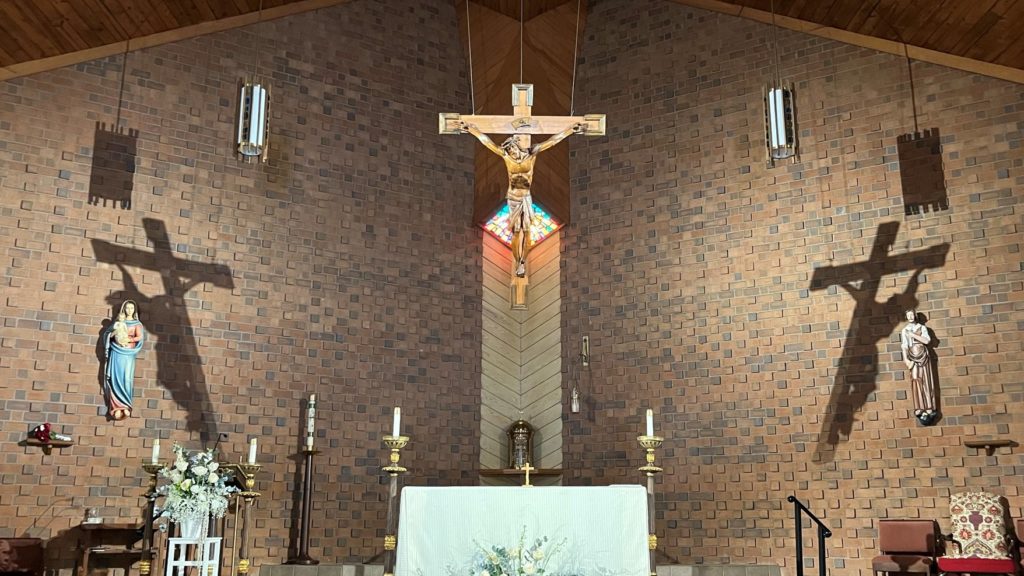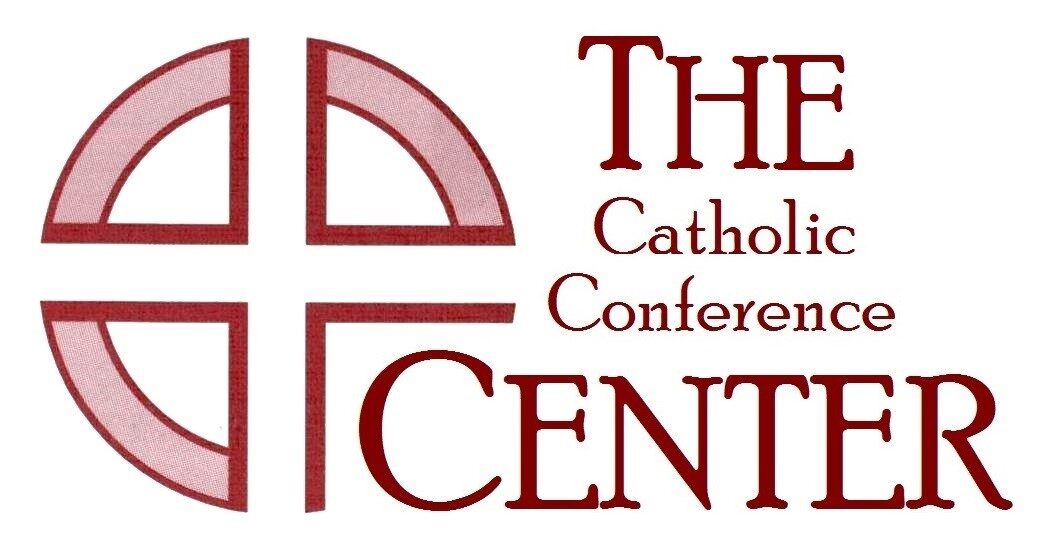Homily for The Solemnity of Our Lord Jesus Christ, King of the Universe
When they came to the place called the Skull,
they crucified Jesus and the two criminals there, one on his right, the other on his left.”
Lk 23:33

I had the opportunity to give a few inmates from Catawba Correctional Center a tour of our church. They were part of a prison choir and were going to perform in our parish hall. Before their performance, I led them to the back of the church. I turned on just enough lights to see the sanctuary. I pointed out some features a person would find in Catholic churches everywhere – the altar, the tabernacle, the ambo, and the statues of Mary and Joseph. I said that most churches have a central crucifix, but ours is uniquely suspended over the altar.
As I was explaining the items in the sanctuary, one inmate elbowed another and said, “These Catholics think of everything!” At first, I was confused. What did he notice? Then the other inmate, noticing the same, said, “They even have the two thieves hanging on the cross with Jesus.” Then I saw the sanctuary through the eyes of a convicted criminal. Beyond all the fine furnishing and statues were two shadows framing the central crucifix. The inmates instantly saw these as the two thieves crucified with Jesus. (Lk 23:15-23)
I shouldn’t have been surprised that convicted felons would see the two thieves instead of the other features of the sanctuary. They’ve been tried and convicted of a crime. Society has labeled them as ‘offenders’ and the tough-on-crime politicians hold them high on a cross for all to see. Felons have a tough, nearly impossible, pathway toward reintegration into a life outside of prison. Many have no car, no healthy friends, no job prospects, and no place to live. They owe thousands in restitution. They’ve probably burned the bridges that would lead them back to their family. Many have addiction problems that a prison sentence fails to address.
These inmates entered the sanctuary and saw two shadows of hope framing the crucified Jesus. Deep down, they desperately wondered if the man hanging on the central cross could be their pathway toward mercy and redemption.
The inmates had intimate familiarity with the scripture of the two thieves. This gave them a glimmer of hope. They knew that one entered paradise. The other did not. They pondered, “What made the difference?”
It’s an important question for the inmates, but also an important question for us. In a sense, we are these two thieves convicted alongside Jesus. The world is messed up. Through our own sin and the sin of the world, we continue to commit grave offenses against God. It is not the creation that God intended, the same creation that on the sixth day God “looked at everything found it very good.” (Gn 1:30) We have hunger, famine, war, and disease. Against each other, we commit crimes of anger, jealousy, rage, violence, and vengeance. The offenses we commit against God, God’s beautiful creation, and God’s children are legion.
We long to find paradise. Like the thieves hanging helpless on their crosses, or the inmates clamoring for an escape from the oppression in prison, we long to hear the words of Jesus, “Amen, I say to you, today you will be with me in Paradise.” Lk 23:43
Back to the question. Two thieves hung on the cross next to Jesus. One entered paradise. The other did not. What made the difference? From the passage, two words come to mind. Repentance and remembering.
Repentence. The first thief was unrepentant, challenging Jesus to the end. “Are you not the Christ? Save yourself and us!” (Lk 23:39) It’s a dismissive attitude that I recognize in myself. When things are going poorly, I will often challenge God instead of surrendering. I look to what God has done or not done to bring about this intolerable situation. I don’t look to my own culpability. In contrast, the second thief made a quick and honest confession. “Have you no fear of God? We have been condemned justly, for the sentence we received corresponds to our crimes, but this man has done nothing criminal.” (Lk 23:40)
Repentance puts us on that path to paradise. It’s a simple acknowledgment of our sins and the sins of humanity as offenses against God. For me, I also need to stop blaming God, and hear the words of the good thief, “This man has done nothing criminal.” Indeed, this man has instead done something loving beyond belief.
Remembering. Jesus welcomed the thief into paradise after a simple request. “Jesus, remember me.” (*Lk 23: 42) ‘Remember me’ is a request that is filled with longing, sadness, pain, and despair. Being forgotten is one of the worst feelings a person can have. The inmates visiting the church that day are part of a forgotten class. But so are many more: the person on the street corner, the old woman in a wheelchair, and the many that are homebound. Being forgotten is a deep human pain, whether it’s because your name was left off of an invite list or whether in your old age you have become irrelevant, even invisible, to the people around you. “Jesus, remember me” is a request that comes from a heart that believes no one else will.
When we cry out, “Jesus, remember me,” we remind ourselves that even though the world has forgotten us as it descends into madness, God has not forgotten us. Simply making the request is a powerful reminder that God loves us, and is willing to die on the cross for us.
The inmates knew this. The good thief knew this. When you feel forgotten, abandoned, and alone, repeat the words, “Jesus, remember me.”
